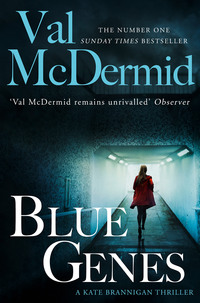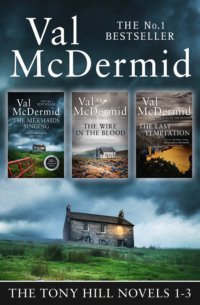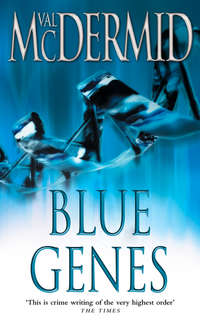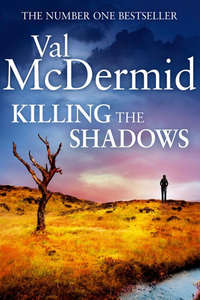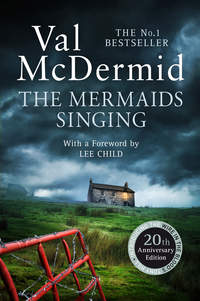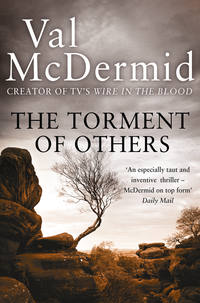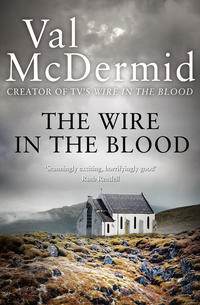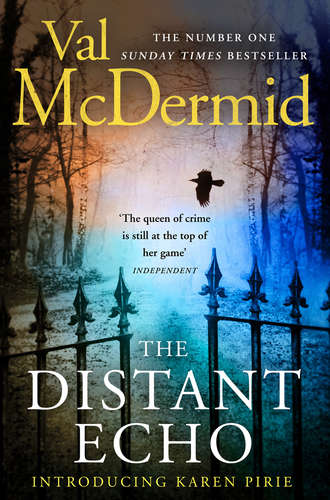
Полная версия
The Distant Echo
To his surprise, Lawson raised a hand, looking faintly embarrassed. ‘Sir? I wondered if there was any significance in the choice of where the body was dumped?’
‘How do you mean?’ Maclennan asked.
‘With it being the Pictish cemetery. Maybe this was some sort of satanic rite? In which case, could it not have been a stranger who just picked on Rosie because she fitted in with what he needed for a human sacrifice?’
Maclennan’s skin crawled at the possibility. What was he thinking of, not to have considered this option? If it had occurred to Jimmy Lawson, it might well occur to the press. And the last thing he wanted was headlines proclaiming there was a ritual killer on the loose. ‘That’s an interesting thought. And one we should all bear in mind. But not one we should mention outside these four walls. For now, let’s concentrate on what we know for sure. The students, the Lammas Bar and the door-to-door. That doesn’t mean closing our eyes to other possibilities. Let’s get busy.’
The briefing over, Maclennan walked through the room, pausing for a word of encouragement here and there as officers bunched around desks, organizing their tasks. He couldn’t help hoping they could tie this to one of the students. That way, they might get a swift result, which was what counted with the public in cases like this. Even better, it wouldn’t leave the town with the taste of suspicion on its tongue. It was always easier when the bad guys came from the outside. Even if the outside, in this instance, was a mere thirty miles away.
Ziggy and Alex got back to their residence with an hour to spare before they had to leave for the bus station. They’d walked down to check and had been assured that the country services were running, although the timetable was more honoured in the breach than the observance. ‘You take your chances,’ the booking clerk had told them. ‘I can’t guarantee a time, but buses there will be.’
They found Weird and Mondo hunched over coffee in the kitchen, both looking disgruntled and unshaven. ‘I thought you were out for the count,’ Alex said, filling the kettle for a fresh brew.
‘Fat fucking chance,’ Weird grumbled.
‘We reckoned without the vultures,’ Mondo said. ‘Journalists. They keep knocking at the door and we keep telling them to piss off. Doesn’t work, though. Ten minutes go by and there they are again.’
‘It’s like a fucking “knock, knock” joke in here. I told the last one if he didn’t piss off, I’d knock his puss into the middle of next week.’
‘Mmm,’ said Alex. ‘And the winner of this year’s Mrs Joyful Prize for Tact and Diplomacy is …’
‘What? I should have let them in?’ Weird exploded. ‘These arseholes, you have to talk to them in language they understand. They don’t take no for an answer, you know.’
Ziggy rinsed a couple of mugs and spooned coffee into them. ‘We didn’t see anyone just now, did we, Alex?’
‘No. Weird must have persuaded them of the error of their ways. If they come back, though, you don’t think we should just give them a statement? It’s not like we’ve got anything to hide.’
‘It would get them off our backs,’ Mondo agreed, but in the way that Mondo always agreed. He specialized in a tone of voice that managed to suggest doubt, always leaving himself a way out if he found himself accidentally swimming against the tide. His need to be loved coloured everything he said, everything he did. That and his need to protect himself.
‘If you think I’m talking to the running dogs of capitalist imperialism, you’ve another think coming.’ Weird, on the other hand, never left room for qualms. ‘They’re scum. When did you ever read a match report that bore any resemblance to the game you’d just seen? Look at the way they ripped the piss out of Ally McLeod. Before we went to Argentina, the man was a god, the hero who was going to bring the World Cup home. And now? He’s not good enough to wipe your arse with. If they can’t get something as straightforward as football right, what chance have we got of getting away without being misquoted?’
‘I love it when Weird wakes up in a good mood,’ Ziggy said. ‘But he’s got a point, Alex. Better to keep our heads down. They’ll have moved on to the next big thing by tomorrow.’ He stirred his coffee and made for the door. ‘I’ve got to finish my packing. We better give ourselves a bit of leeway, leave a bit earlier than usual. It’s hard going underfoot and, thanks to Maclennan, none of us have got decent shoes. I can’t believe I’m walking around in wellies.’
‘Watch out, the style police’ll get you,’ Weird shouted after him. He yawned and stretched. ‘I can’t believe how tired I am. Has anybody got any dexys?’
‘If we did, they’d have been flushed down the toilet hours ago,’ Mondo said. ‘Are you forgetting the pigs have been crawling all over the place?’
Weird looked abashed. ‘Sorry. I’m not thinking straight. You know, when I woke up, I could almost believe last night was nothing more than a bad trip. That would have been enough to put me off acid for life, I tell you.’ He shook his head. ‘Poor lassie.’
Alex took that as his cue to disappear upstairs and cram a last bundle of books in his holdall. He wasn’t sorry to be going home. For the first time since he’d started living with the other three, he felt claustrophobic. He longed for his own bedroom; a door he could close that nobody else would think of opening without permission.
It was time to leave. Three holdalls and Ziggy’s towering rucksack were piled in the hall. The Laddies fi’ Kirkcaldy were ready to head for home. They shouldered their bags and opened the door, Ziggy leading the way. Unfortunately, the effect of Weird’s hard words had apparently worn off. As they emerged on the churned-up slush of their path, five men materialized as if from nowhere. Three carried cameras, and before the foursome even realized what was happening, the air was thick with the sounds of Nikon motor drives.
The two journalists were coming round the flank of the photographers, shouting questions. They managed to make themselves sound like an entire press conference, so quickfire were their enquiries. ‘How did you find the girl?’ ‘Which one of you made the discovery?’ ‘What were you doing on Hallow Hill in the middle of the night?’ ‘Was this some sort of satanic rite?’ And of course, inevitably, ‘How do you feel?’
‘Fuck off,’ Weird roared at them, swinging his heavy bag in front of him like an overweight scythe. ‘We’ve got nothing to say to you.’
‘Jesus, Jesus, Jesus,’ Mondo muttered like a record stuck in the groove.
‘Back indoors,’ Ziggy shouted. ‘Get back inside.’
Alex, bringing up the rear, reversed hastily. Mondo tumbled in, almost tripping over him in his haste to get away from the insistent badgering and the clicking cameras. Weird and Ziggy followed, slamming the door behind them. They looked at each other, hunted and haunted. ‘What do we do now?’ Mondo asked, voicing what they were all wondering. They all looked blank. This was a situation entirely outwith their limited experience of the world.
‘We can’t sit tight,’ Mondo continued petulantly. ‘We’ve got to get back to Kirkcaldy. I’m supposed to start at Safeway at six tomorrow morning.’
‘Me and Alex too,’ said Weird. They all looked expectantly at Ziggy.
‘OK. What if we go out the back way?’
‘There isn’t a back way, Ziggy. We’ve only got a front door,’ Weird pointed out.
‘There’s a toilet window. You three can get out that way, and I’ll stay put. I’ll move around upstairs, putting lights on and stuff so they’ll think we’re still here. I can go home tomorrow, when the heat’s died down.’
The other three exchanged looks. It wasn’t a bad idea. ‘Will you be all right on your own?’ Alex asked.
‘I’ll be fine. As long as one of you rings my mum and dad and explains why I’m still here. I don’t want them finding out about this from the papers.’
‘I’ll phone,’ Alex volunteered. ‘Thanks, Ziggy.’
Ziggy raised his arm and the other three followed suit. They gripped hands in a familiar four-way clasp. ‘All for one,’ Weird said.
‘And one for all,’ the others chorused. It made as much sense now as it had when they’d first done it nine years before. For the first time since he’d stumbled over Rosie Duff in the snow, Alex felt a faint flicker of comfort.
7
Alex trudged over the railway bridge, turning right into Balsusney Road. Kirkcaldy was like a different country. As the bus had meandered its way along the Fife Coast, the snow had gradually given way to slush, then to this biting grey damp. By the time the northeast wind made it this far, it had dumped its load of snow and had nothing to offer the more sheltered towns further up the estuary but chilly gusts of rain. He felt like one of Breughel’s more miserable peasants plodding wearily home.
Alex lifted the latch on the familiar wrought-iron gate and walked up the short path to the little stone villa where he’d grown up. He fumbled his keys out of his trouser pocket and let himself in. A blast of warmth enveloped him. They’d had central heating installed over the summer, and this was the first time he’d experienced the difference it made. He dumped his bag by the door and shouted, ‘I’m home.’
His mother appeared from the kitchen, wiping her hands on a dishtowel. ‘Alex, it’s lovely to have you back. Come away through, there’s soup and there’s stew. We’ve had our tea, I was expecting you earlier. I suppose it was the weather? I saw on the local news you’d had it bad up there.’
He let her words wash over him, their familiar tone and content a security blanket. He hauled off his kagoule and walked down the hall to give her a hug. ‘You look tired, son,’ she said, concern in her voice.
‘I’ve had a pretty terrible night, Mum,’ he said, following her back into the tiny kitchen.
From the living room, his father’s voice. ‘Is that you, Alex?’
‘Aye, Dad,’ he called back. ‘I’ll be through in a minute.’
His mother was already dishing up a plate of soup, handing him the bowl and a spoon. While there was food to be served, Mary Gilbey had no attention to be spared for minor details like personal grief. ‘Away and sit with your dad. I’ll heat up the stew. There’s a baked potato in the oven.’
Alex went through to the living room where his father sat in his armchair, the TV facing him. There was a place set at the dining table in the corner and Alex sat down to his soup. ‘All right, son?’ his father asked, not taking his eyes off the game show on the screen.
‘No, not really.’
That got his father’s attention. Jock Gilbey turned and gave his son the sort of scrutiny that schoolteachers are adept at. ‘You don’t look good,’ he said. ‘What’s bothering you?’
Alex swallowed a spoonful of soup. He hadn’t felt hungry, but at the first taste of home-made Scotch broth, he’d realized he was ravenous. The last he’d eaten had been at the party and he’d lost that twice over. All he wanted now was to fill his belly, but he was going to have to sing for his supper. ‘A terrible thing happened last night,’ he said between mouthfuls. ‘There was a girl murdered. And it was us that found her. Well, me, actually, but Ziggy and Weird and Mondo were with me.’
His father stared, mouth agape. His mother had walked in on the tail end of Alex’s revelation and her hands flew to her face, her eyes wide and horrified. ‘Oh, Alex, that’s … Oh, you poor wee soul,’ she said, rushing to him and taking his hand.
‘It was really bad,’ Alex said. ‘She’d been stabbed. And she was still alive when we found her.’ He blinked hard. ‘We ended up spending the rest of the night at the police station. They took all our clothes and everything, like they thought we had something to do with it. Because we knew her, you see. Well, not really knew her. But she was a barmaid in one of the pubs we sometimes go to.’ Appetite deserted him at the memory, and he put his spoon down, his head bowed. A tear formed at the corner of his eye and trickled down his cheek.
‘I’m awful sorry, son,’ his father said inadequately. ‘That must have been a hell of a shock.’
Alex tried to swallow the lump in his throat. ‘Before I forget,’ he said, pushing his chair back. ‘I need to phone Mr Malkiewicz and tell him Ziggy won’t be home tonight.’
Jock Gilbey’s eyes widened in shock. ‘They’ve not kept him at the police station?’
‘No, no, nothing like that,’ Alex said, wiping his eyes with the back of his hand. ‘We had journalists on the doorstep at Fife Park, wanting pictures and interviews. And we didn’t want to talk to them. So me and Weird and Mondo climbed out the toilet window and went off the back way. We’re all supposed to be working at Safeway tomorrow, see? But Ziggy’s not got a job, so he said he’d stay behind and come home tomorrow. We didn’t want to leave the window unlocked, you know? So I’ve got to phone his dad and explain.’
Alex gently freed himself from his mother’s hand and went through to the hall. He lifted the phone and dialled Ziggy’s number from memory. He heard the ringing tone, then the familiar Polish-accented Scots of Karel Malkiewicz. Here we go again, Alex thought. He was going to have to explain last night once more. He had a feeling it wouldn’t be the last time either.
‘This is what happens when you fritter the nights away drinking and God knows what else,’ Frank Mackie said bitterly. ‘You get yourself in bother with the police. I’m a respected man in this town, you know. The police have never been at my door. But all it takes is one useless galloot like you, and we’ll be the talk of the steamie.’
‘If we hadn’t been out late, she’d have lain there till morning. She’d have died on her own,’ Weird protested.
‘That’s none of my concern,’ his father said, crossing the room and pouring himself a whisky from the corner bar he’d had installed in the front room to impress those of his clients deemed respectable enough to be invited into his home. It was fitting, he thought, that an accountant should show the trappings of achievement. All he’d wanted was for his son to show some signs of aspiration, but instead, he had spawned a useless waster of a boy who spent his nights in the pub. What was worse was that Tom clearly had a gift for figures. But instead of harnessing that practically by going in for accountancy, he’d chosen the airy-fairy world of pure mathematics. As if that was the first step on the road to prosperity and decency. ‘Well, that’s that. You’re staying in every night, my lad. No parties, no pubs for you this holiday. You’re confined to barracks. You go to your work, and you come straight home.’
‘But Dad, it’s Christmas,’ Weird protested. ‘Everybody will be out. I want to catch up with my pals.’
‘You should have thought about that before you got yourself in trouble with the police. You’ve got exams this year. You can use the time to study. You’ll thank me for it, you know.’
‘But Dad …
‘That’s my last word on the subject. While you live under my roof, while I’m paying for you to go to the university, you’ll do as you’re told. When you start earning a living wage of your own, then you can make the rules. Till then, you do as I say. Now get out of my sight.’
Fuming, Weird stormed out of the room and ran up the stairs. God, he hated his family. And he hated this house. Raith Estate was supposed to be the last word in modern living, but he thought this was yet another con perpetrated by the grey men in suits. You didn’t have to be smart to recognize that this wasn’t a patch on the house they used to live in. Stone walls, solid wooden doors with panels and beading, stained glass in the landing window. That was a house. OK, this box had more rooms, but they were poky, the ceilings and doorways so low that Weird felt he had to stoop constantly to accommodate his six feet and three inches. The walls were paper thin too. You could hear someone fart in the next room. Which was pretty funny, when you thought about it. His parents were so repressed, they wouldn’t know an emotion if it bit them on the leg. And yet they’d spent a fortune on a house that stripped everyone of privacy. Sharing a room with Alex felt more privileged than living under his parents’ roof.
Why had they never made any attempt to understand the first thing about him? He felt as if he’d spent his whole life in rebellion. Nothing he achieved had ever cut any ice here because it didn’t fit the narrow confines of his parents’ aspirations. When he’d been crowned school chess champion, his father had harrumphed that he’d have been better off joining the bridge team. When he’d asked to take up a musical instrument, his father had refused point blank, offering to buy him a set of golf clubs instead. When he’d won the mathematics prize every single year in high school, his father had responded by buying him books on accountancy, completely missing the point. Maths to Weird wasn’t about totting up figures; it was the beauty of the graph of a quadratic equation, the elegance of calculus, the mysterious language of algebra. If it hadn’t been for his pals, he’d have felt like a complete freak. As it was, they’d given him a place to let off steam safely, a chance to spread his wings without crashing and burning.
And all he’d done in return was to give them grief. Guilt washed over him as he remembered his latest madness. This time, he’d gone too far. It had started as a joke, nicking Henry Cavendish’s motor. He’d had no idea then where it might lead. None of the others could save him from the consequences if this came out, he realized that. He only hoped he wouldn’t bring them down with him.
Weird slotted his new Clash tape into the stereo and threw himself down on the bed. He’d listen to the first side, then he’d get ready for bed. He had to be up at five to meet Alex and Mondo for their early shift at the supermarket. Normally, the prospect of rising so early would have depressed the hell out of him. But the way things were here, it would be a relief to be out of the house, a mercy to have something to stop his mind spinning in circles. Christ, he wished he had a joint.
At least his father’s emotional brutality had pushed the invasive thoughts of Rosie Duff to one side. By the time Joe Strummer sang ‘Julie’s in the Drug Squad’, Weird was locked in deep, dreamless sleep.
Karel Malkiewicz drove like an old man at the best of times. Hesitant, slow, entirely unpredictable at junctions. He was also a fair-weather driver. Under normal circumstances, the first sign of fog or frost would mean the car stayed put and he’d walk down the steep hill of Massareene Road to Bennochy, where he could catch a bus that would take him to Factory Road and his work as an electrician in the floor-covering works. It had been a long time since the disappearance of the pall of linseed oil that had given the town its reputation of ‘the queer-like smell’, but although linoleum had plummeted out of fashion, what came out of Nairn’s factory still covered the floors of millions of kitchens, bathrooms and hallways. It had given Karel Malkiewicz a decent living since he’d come out of the RAF after the war, and he was grateful.
That didn’t mean he’d forgotten the reasons why he’d left Krakow in the first place. Nobody could survive that toxic atmosphere of mistrust and perfidy without scars, especially not a Polish Jew who had been lucky enough to get out before the pogrom that had left him without a family to call his own.
He’d had to rebuild his life, create a new family for himself. His old family had never been particularly observant, so he hadn’t felt too bereft by his abandonment of his religion. There were no Jews in Kirkcaldy, he remembered someone telling him a few days after he’d arrived in the town. The sentiment was clear: ‘That’s the way we like it.’ And so he’d assimilated, even going so far as to marry his wife in a Catholic church. He’d learned how to belong in this strange, insular land that had made him welcome. He’d surprised himself at the fierce possessive pride he’d felt when a Pole had become Pope so recently. He so seldom thought of himself as Polish these days.
He’d been almost forty when the son he’d always dreamed of had finally arrived. It was a cause for rejoicing, but also for a renewal of fear. Now he had so much more to lose. This was a civilized country. The fascists could never gain a hold here. That was the received wisdom, anyway. But Germany too had been a civilized country. No one could predict what might happen in any country when the numbers of the dispossessed reached a critical mass. Anyone who promised salvation would find a following.
And lately, there had been good grounds for fear. The National Front were creeping through the political undergrowth. Strikes and industrial unrest were making the government edgy. The IRA’s bombing campaign gave the politicians all the excuses they needed for introducing repressive measures. And that cold bitch who ran the Tory party talked of immigrants swamping the indigenous culture. Oh yes, the seeds were all there.
So when Alex Gilbey had rung and told him his son had spent the night in a police station, Karel Malkiewicz had no choice. He wanted his boy under his roof, under his wing. Nobody would come and take his son away in the night. He wrapped up warmly, instructing his wife to prepare a flask of hot soup and a parcel of sandwiches. Then he set off across Fife to bring his son home.
It took him nearly two hours to negotiate the thirty miles in his elderly Vauxhall. But he was relieved to see lights on in the house Sigmund shared with his friends. He parked the car, picked up his supplies and marched up the path.
There was no answer to his knocking at first. He stepped gingerly on to the snow and looked in through the brightly lit kitchen window. The room was empty. He banged on the window and shouted, ‘Sigmund! Open up, it’s your father.’
He heard the sound of feet clattering down stairs, then the door opened to reveal his handsome son, grinning from ear to ear, his arms spread wide in welcome. ‘Dad,’ he said, stepping barefoot into the slush to embrace his father. ‘I didn’t expect to see you.’
‘Alex called. I didn’t want you to be alone. So I came to get you.’ Karel clasped his son to him, the butterfly of fear beating its wings inside his chest. Love, he thought, was a terrible thing.
Mondo sat cross-legged on his bed, within easy reach of his turntable. He was listening, over and over again, to his personal theme, ‘Shine On, You Crazy Diamond’. The swooping guitars, the heartfelt anguish of Roger Waters’ voice, the elegiac synths, the breathy saxophone provided the perfect soundtrack for wallowing to.
And wallowing was exactly what Mondo wanted to do. He’d escaped the smother of his mother’s concern that had swamped him as soon as he’d explained what had happened. It had been quite pleasant for a while, the familiar cocoon of concern spinning itself around him. But gradually, it had started to stifle him and he’d excused himself with the need to be alone. The Greta Garbo routine always worked with his mother, who thought he was an intellectual because he read books in French. It seemed to escape her notice that that’s what you had to do when you were studying the subject at degree level.
Just as well, really. He couldn’t have begun to explain the turmoil of emotion that threatened to swamp him. Violence was alien to him, a foreign language whose grammar and vocabulary he’d never assimilated. His recent confrontation with it had left him feeling shaky and strange. He couldn’t honestly say he was sorry Rosie Duff was dead; she’d humiliated him in front of his friends more than once when he’d tried on the chat-up lines that seemed to work with other lassies. But he was sorry that her death had plummeted him into this difficult place where he didn’t belong.
What he really needed was sex. That would take his mind off the horrors of the night before. It would be a sort of therapy. Like getting back on the horse. Unfortunately, he lacked the amenity of a girlfriend in Kirkcaldy. Maybe he should make a couple of phone calls. One or two of his exes would be more than happy to renew their relationship. They’d be a willing ear for his woes and it would tide him over the holidays at least. Judith, maybe. Or Liz. Yeah, probably Liz. The chubby ones were always so pathetically grateful for a date, they came across with no effort at all. He could feel himself growing hard at the thought.


